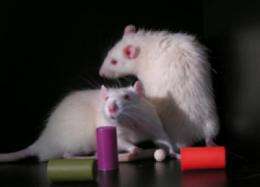Brain regions can take short naps during wakefulness, leading to errors

If you've ever lost your keys or stuck the milk in the cupboard and the cereal in the refrigerator, you may have been the victim of a tired brain region that was taking a quick nap.
Researchers at the University of Wisconsin-Madison have a new explanation. They've found that some nerve cells in a sleep-deprived yet awake brain can briefly go "off line," into a sleep-like state, while the rest of the brain appears awake.
"Even before you feel fatigued, there are signs in the brain that you should stop certain activities that may require alertness," says Dr. Chiara Cirelli, professor of psychiatry at the School of Medicine and Public Health. "Specific groups of neurons may be falling asleep, with negative consequences on performance."
Until now, scientists thought that sleep deprivation generally affected the entire brain. Electroencephalograms (EEGs) show network brain-wave patterns typical of either being asleep or awake.
"We know that when we are sleepy, we make mistakes, our attention wanders and our vigilance goes down," says Cirelli. "We have seen with EEGs that even while we are awake, we can experience shorts periods of 'micro sleep.' "
Periods of micro sleep were thought to be the most likely cause of people falling asleep at the wheel while driving, Cirelli says.
But the new research found that even before that stage, brains are already showing sleep-like activity that impairs them, she says.
• Follow Medical Xpress on Facebook!
• Follow Medical Xpress on Twitter!
As reported in the current issue of Nature, the researchers inserted probes into specific groups of neurons in the brains of freely-behaving rats. After the rats were kept awake for prolonged periods, the probes showed areas of "local sleep" despite the animals' appearance of being awake and active.
"Even when some neurons went off line, the overall EEG measurements of the brain indicated wakefulness in the rats," Cirelli says.
And there were behavioral consequences to the local sleep episodes.
"When we prolonged the awake period, we saw the rats start to make mistakes," Cirelli says.
When animals were challenged to do a tricky task, such as reaching with one paw to get a sugar pellet, they began to drop the pellets or miss in reaching for them, indicating that a few neurons might have gone off line.
"This activity happened in few cells," Cirelli adds. "For instance, out of 20 neurons we monitored in one experiment, 18 stayed awake. From the other two, there were signs of sleep—brief periods of activity alternating with periods of silence."
The researchers tested only motor tasks, so they concluded from this study that neurons affected by local sleep are in the motor cortex.
More information: Local sleep in awake rats. Vyazovskiy VV, Olcese U, Hanlon EC, Nir Y, Cirelli C, Tononi G. Nature. 2011 April 28.
















